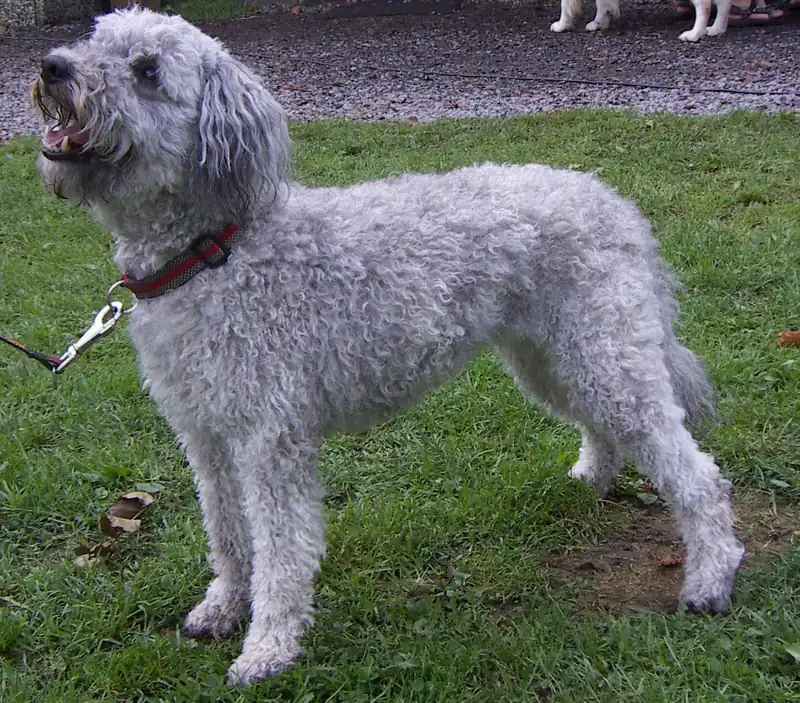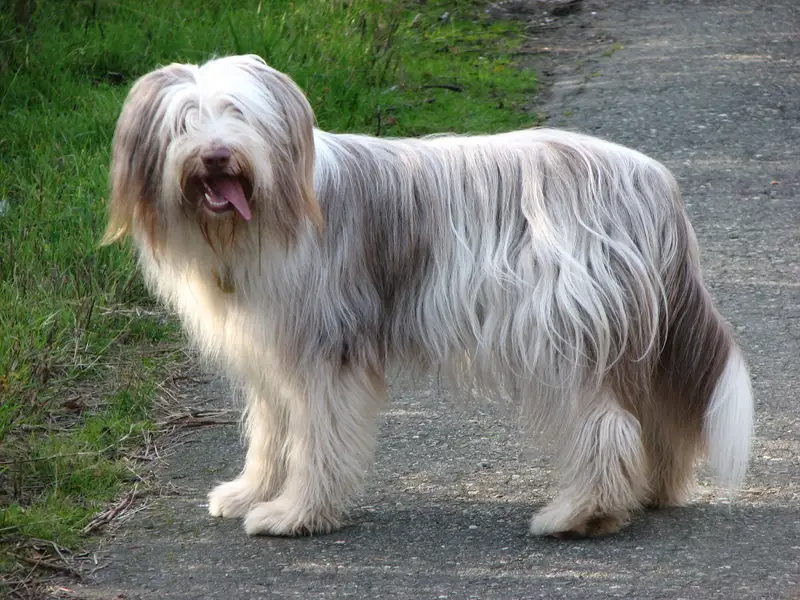Portuguese Sheepdog
Also known as: Cão da Serra de Aires, Cão Macaco
The Portuguese Sheepdog is a medium-sized, intelligent herding breed known for its lively personality and strong work ethic. With a history rooted in livestock herding, this affectionate dog excels in agility and obedience, making it a wonderful companion for active families.
⚡At a glance
🏆Best traits
Key Facts
- Height
- 41-56 cm
- Weight
- 12-18 kg
- Life Span
- 9 - 12 years
- Group
- Herding
- Origin
- Portugal
- Shedding
- Moderate
- Exercise
- 90 min/day
- Best For
- Families, Active Owners
Overview
🐕Breed Overview
✨Key Traits
💡What Makes Portuguese Sheepdog Special
The Portuguese Sheepdog stands out for its strong herding instincts and versatility. This breed is exceptionally trainable, excelling in various canine sports, including agility and obedience.
Their lively nature makes them a joy to have around, as they are always eager to play and engage with their families. Additionally, their protective instincts make them excellent watchdogs, alerting their owners to any potential threats.
The breed's adaptability allows them to thrive in different environments, whether as a working dog on a farm or a beloved family pet in an urban setting. Overall, the Portuguese Sheepdog is a unique and dynamic breed that brings joy and companionship to those who welcome them into their homes.
The Portuguese Sheepdog, also known as Cão da Serra de Aires, is a medium-sized herding breed that hails from the rugged terrains of Portugal. With a height ranging from 16 to 22 inches and a weight between 26 to 40 pounds, this breed is known for its lively personality and strong work ethic. Historically, the Portuguese Sheepdog was bred for herding and guarding livestock, showcasing its intelligence and trainability.
Its affectionate nature makes it a wonderful companion, while its agility and herding instincts allow it to excel in various canine sports. The breed's coat is long and thick, requiring moderate grooming, and it comes in a variety of colors, including yellow, chestnut, and grey. With an average lifespan of 9 to 12 years, the Portuguese Sheepdog is a healthy breed with few known health issues.
They thrive in active households where they can participate in daily exercise and mental stimulation. Their friendly demeanor makes them suitable for families, although early socialization is essential to ensure they interact well with children and other pets. Overall, the Portuguese Sheepdog is a versatile and loyal companion, making it a great addition to any home.
🎉Fun Facts
Historically used for herding a variety of livestock, including sheep, goats, and cattle.
Known as Cão Macaco, meaning 'Monkey Dog' due to its cheeky personality.
Portuguese Sheepdogs excel in agility and obedience competitions, showcasing their intelligence and trainability.
The breed has a unique coat texture described as 'goat-like.'
Breed Characteristics
Family & Friends
Good Behavior
Get Up & Go
Household Harmony
Temperament & Personality
🐕Core Temperament
The Portuguese Sheepdog is characterized by its friendly and lively temperament. They are affectionate with their families and enjoy being involved in family activities. This breed is known for its intelligence and eagerness to please, making them relatively easy to train.
They are generally good with children and can be socialized to get along well with other pets. However, their herding instincts may lead them to exhibit nipping behaviors if not properly managed. The Portuguese Sheepdog is also protective of its family and territory, making them excellent watchdogs.
Overall, their temperament is well-suited for active families who can provide them with the exercise and mental stimulation they need.
💫Personality Profile
The Portuguese Sheepdog is known for its lively and intelligent personality. They are affectionate with their families and often form strong bonds with their owners.
This breed is playful and enjoys engaging in various activities, making them great companions for active households. They are generally friendly with other dogs and can be socialized to get along well with children.
However, they may exhibit herding behaviors, such as nipping, if not properly trained. Their intelligence allows them to learn commands quickly, but they can also be independent thinkers, requiring consistent training and socialization to ensure they develop into well-mannered pets.
🔊Vocal Tendencies
The Portuguese Sheepdog has a moderate noise level. They are known to bark to alert their owners of strangers or unusual sounds, but they are not excessive barkers.
Their vocalizations can vary depending on the situation; they may bark excitedly during play or when greeting visitors. While they are generally not prone to excessive barking, proper training and socialization are essential to ensure they understand when barking is appropriate.
Overall, their vocal behavior is typical of herding breeds, as they use barking as a form of communication.
Affection & Social Traits
Warm and balanced socially — here’s how it shows up day to day.
Energy & Activity
Moderate, steady energy — great for matching your routine.
Communication Style
Moderately talkative — a quick read on noise at home.
Care Requirements
🏃♂️Exercise Requirements
Daily Exercise
The Portuguese Sheepdog, or Cão da Serra de Aires, is a highly active breed that requires a significant amount of exercise to maintain its physical and mental well-being. Ideally, this breed needs at least 60 to 90 minutes of vigorous exercise each day. This can be broken down into multiple sessions, including brisk walks, runs, or playtime in a secure area.
Activities like fetching, agility training, and herding exercises are particularly beneficial, as they cater to the breed's natural instincts and energy levels. Puppies should engage in shorter, more frequent play sessions to avoid overexertion, while adult dogs thrive on a mix of high-energy activities and mental challenges. Regular exercise not only helps manage their weight but also reduces the likelihood of behavioral issues stemming from boredom or pent-up energy.
Insufficient exercise can lead to destructive behaviors, anxiety, and obesity, making it crucial for owners to commit to a consistent exercise routine.
Preferred Activities
🏠Living & Adaptability
Space Requirements
The Portuguese Sheepdog is adaptable to various living environments but thrives best in homes with ample outdoor space. A medium-sized yard is ideal, allowing them to run and play freely.
While they can adapt to apartment living, it is essential that owners are committed to providing sufficient exercise and mental stimulation through daily walks and playtime. The breed's size and energy level mean that they can become restless in confined spaces, leading to potential behavioral issues.
Owners in smaller living situations should ensure they have access to parks or open areas for regular exercise and socialization.
Climate Preference
🍲Feeding Guide
Schedule
Food Types
Portion Size
Special Nutritional Needs
The Portuguese Sheepdog does not have any specific dietary restrictions, but it is essential to provide a balanced diet rich in protein and essential nutrients to support their active lifestyle. Regular veterinary check-ups can help identify any food sensitivities or allergies. Owners should monitor their dog's weight and adjust portion sizes accordingly to prevent obesity.
✨Grooming Requirements
Grooming Overview
The Portuguese Sheepdog has a long, thick coat that requires regular grooming to keep it healthy and free of tangles. Brushing should be done at least once a week to remove loose hair and prevent matting. During shedding seasons, more frequent brushing may be necessary.
Bathing should be done as needed, typically every few months or when the dog gets particularly dirty. It's important to use a mild dog shampoo to avoid skin irritation. Regular nail trimming and ear cleaning are also essential to maintain overall hygiene.
Despite the lack of an undercoat, the breed's coat can be somewhat weather-resistant, so owners should be mindful of their dog's comfort in extreme temperatures.
Care Schedule
Brush weekly, bathe every 1-3 months, trim nails every 2-4 weeks.
Health Profile
⚕️Health Care
Regular health care is vital for the Portuguese Sheepdog's lifespan. Routine veterinary check-ups, vaccinations, and preventive treatments can help catch potential health issues early. Maintaining a balanced diet, providing regular exercise, and monitoring for any changes in behavior or health are essential practices for keeping this breed healthy throughout its life.
Health Issues Overview
⏳Average Lifespan
Genetic Factors
Genetics play a crucial role in the Portuguese Sheepdog's lifespan, with certain hereditary health issues potentially affecting their longevity. Responsible breeding practices that prioritize genetic diversity can help reduce the risk of inherited health problems. Prospective owners should seek out reputable breeders who conduct health testing on their breeding stock to ensure the best possible genetic background for their new puppy.
Living Conditions
The Portuguese Sheepdog's lifespan can be influenced by various environmental factors, including housing conditions, climate, and social interactions. Dogs living in a stimulating environment with regular exercise and socialization tend to live longer, healthier lives.
Exposure to extreme weather conditions can impact their health, so providing adequate shelter and temperature control is essential. Additionally, a strong bond with their family and regular veterinary care can significantly enhance their quality of life and longevity.
🏥Common Health Issues
Ehrlichiosis
Warning Signs
🔬Diagnosis
Diagnosed through blood tests and clinical signs.
💊Treatment
Antibiotics and supportive care.
📝Management Tips
Regular tick prevention measures and prompt veterinary care if symptoms arise.
Abdominal tumors
Warning Signs
🔬Diagnosis
Ultrasound or echogram for older dogs.
💊Treatment
Surgical intervention or palliative care as needed.
📝Management Tips
Regular veterinary check-ups after age 8 to monitor health.
🛡️Preventive Care
🔬General health check-up
Evaluates the dog's overall health and detects any underlying issues.
📅 Annually after 1 year of age.
🔬Tick-borne disease screening
Screens for tick-borne diseases and other infections.
📅 Every 6 months, especially in tick-prone areas.
🔬Abdominal ultrasound
Monitors for signs of abdominal tumors or other internal issues.
📅 Annually after 8 years of age.
Training
🧠Intelligence & Trainability
💪Work Drive
The Portuguese Sheepdog has a strong work drive, stemming from its herding background. This breed thrives when given tasks or jobs to do, whether it's herding livestock, participating in agility competitions, or engaging in obedience training.
Providing mental stimulation through puzzle toys, training exercises, and interactive play is essential for their well-being. Without sufficient engagement, these dogs may become bored and exhibit undesirable behaviors.
Owners should aim to incorporate a variety of activities into their routine to keep their Portuguese Sheepdog mentally and physically stimulated.
⚠️Training Considerations
While the Portuguese Sheepdog is generally intelligent and trainable, it can exhibit some behavioral challenges, particularly if not properly socialized or exercised. Common issues include herding behaviors directed towards children or other pets, as well as barking when bored or anxious.
To mitigate these challenges, early socialization is crucial, exposing the dog to various environments, people, and animals. Consistent training using positive reinforcement methods can help curb unwanted behaviors and reinforce good manners.
Engaging the dog in regular physical and mental activities will also reduce the likelihood of behavioral issues arising from boredom or excess energy.
📝Training Tips
Training a Portuguese Sheepdog requires patience and consistency. Utilizing positive reinforcement techniques, such as treats and praise, can enhance the dog's learning experience.
Start with basic commands and gradually introduce more complex tasks, ensuring that training sessions are kept short and engaging to maintain the dog's interest. Incorporating play into training can also be beneficial, as these dogs enjoy interactive activities.
Socialization is equally important; exposing the dog to different environments, people, and other animals will help develop a well-rounded temperament. Regular training and mental stimulation will keep the Portuguese Sheepdog happy and well-behaved.
History & Heritage
📜Origin Story
The Portuguese Sheepdog, or Cão da Serra de Aires, hails from the rugged Serra de Aires mountains in Portugal, where it was bred for herding and guarding livestock. ' The breed's history is intertwined with the pastoral lifestyle of the region, where farmers relied on these dogs to manage sheep, goats, and cattle.
The Cão Macaco, or 'Monkey Dog,' nickname comes from its distinctive facial fur and playful demeanor. Despite the challenges posed by the harsh climate of the Serra de Aires, these dogs have thrived, showcasing their resilience and adaptability.
Over the years, the breed has gained recognition beyond Portugal, becoming a cherished companion and participant in dog sports across Europe and the United States.
⏳Development History
The Portuguese Sheepdog is believed to have ancient roots, with its ancestors traditionally used for herding livestock in the Serra de Aires region of Portugal. While specific records of the breed's early history are scarce, it is thought to be closely related to other European sheepdog breeds, such as the Pyrenean Sheepdog and Briard. The breed was officially recognized by the Portuguese Kennel Club in the 1990s, and its breed standard was established by Dr.
Antonio Cabral and Dr. Felipe Morgado Romeiros. The breed's development has been influenced by its working roles, leading to the establishment of traits that prioritize intelligence, agility, and strong herding instincts.
Today, the Portuguese Sheepdog is celebrated for its versatility, excelling in various canine sports and as a loyal companion.
🛡️Purpose & Historical Role
Historically, the Portuguese Sheepdog was primarily used for herding and guarding livestock, including sheep, goats, and cattle. Its strong herding instincts and intelligence made it an invaluable asset to farmers in rural Portugal.
The breed's ability to navigate challenging terrains and protect livestock from predators solidified its role as a trusted working dog. In modern times, the Portuguese Sheepdog has transitioned into a versatile companion, excelling in agility, obedience, and herding competitions.
Its friendly nature and adaptability have also made it a popular choice for families seeking a loyal pet.
🏺Cultural Significance
The Portuguese Sheepdog, known as Cão da Serra de Aires, is an integral part of Portugal's cultural heritage, particularly in rural areas where it has been used for centuries as a herding and guarding dog. Its lively personality and strong work ethic have made it a beloved companion among farmers and shepherds.
The breed's unique appearance and characteristics have also captured the interest of dog enthusiasts worldwide, contributing to its recognition in various dog shows and competitions. The breed's historical role in livestock management reflects the traditional agricultural practices of Portugal, making it a symbol of the country's rural identity.
Additionally, its adaptability and intelligence have allowed it to transition into a family pet, further solidifying its place in Portuguese culture.
Conservation Status
The breed exists today and isn’t classified as extinct.
Less widespread; more likely to be region-specific or niche.
This breed is less common but has stable populations in certain regions.
?Frequently Asked Questions
Is the Portuguese Sheepdog good for apartment living?
The Portuguese Sheepdog can be moderate when it comes to apartment living. With adequate daily exercise and mental stimulation, apartment life can work, but they would benefit from more space. Regular walks and interactive play sessions are important for their well-being.
How much does a Portuguese Sheepdog shed?
The Portuguese Sheepdog has a moderate shedding level. You can expect some hair around the house, especially during seasonal changes. Regular brushing a few times per week will help keep shedding under control.
Are Portuguese Sheepdogs easy to train?
The Portuguese Sheepdog can be moderate when it comes to training. They can learn commands and routines with consistent effort, though they may sometimes show a stubborn streak. Patience, positive reinforcement, and regular practice sessions will yield the best results.
How long do Portuguese Sheepdogs live?
The average lifespan of a Portuguese Sheepdog is 9 - 12 years. Lifespan can be influenced by genetics, diet, exercise, and overall health care. Regular veterinary check-ups and a healthy lifestyle can help your Portuguese Sheepdog live a long and happy life.
Is the Portuguese Sheepdog good with kids?
Yes, the Portuguese Sheepdog generally does well with children. They are patient and affectionate, making them a solid family dog. As with any breed, supervision during interactions with young children is always recommended.
How much exercise does a Portuguese Sheepdog need?
The Portuguese Sheepdog is a high-energy breed that needs approximately 90 minutes of exercise daily. They thrive with vigorous activities such as running, hiking, or interactive games. Without adequate exercise, they may develop behavioral issues from pent-up energy.
Is the Portuguese Sheepdog good with other pets?
The Portuguese Sheepdog can be moderate around other pets. They can get along with other animals when properly introduced and socialized from an early age. Gradual introductions and positive associations will help build harmonious relationships.









